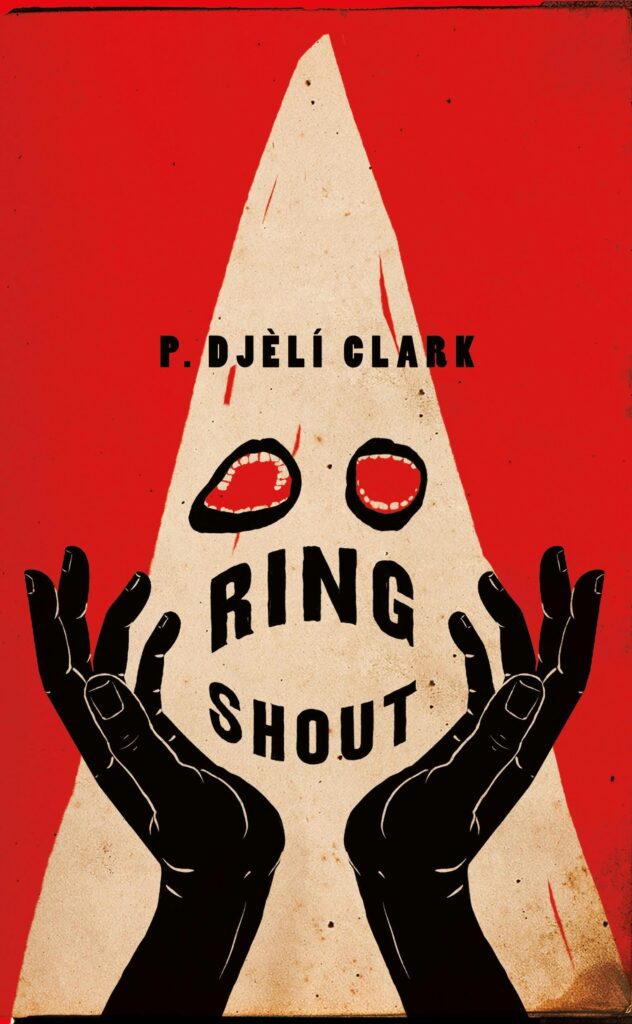
Author P. Djèlí Clark said the earliest seeds for Ring Shout, his 2020 horror/sci-fi novella, were planted nearly 15 years ago when he first encountered the slave narratives compiled by the Works Progress Administration.
“And in these narratives, the former slaves described [Ku Klux Klan members] as haints (evil spirits) and monsters,” Clark said in an early October interview. “And that was something I had to sit with, where I was asking, ‘Why would they do this?’ They knew who these people were. They could be like, ‘Yeah, that’s judge so-and-so. I know who he is behind that mask.’ And yet they pass along this folklore. And that made me think about the purpose of storytelling, the purpose of folklore, and even the purpose of horror. … And it almost seemed like reimagining the Klan as these supernatural creatures came about for them as a way of dealing with this trauma.”
For the better part of a decade, this idea embedded itself in the back of Clark’s brain, resurfacing unexpectedly when he started a fellowship in Indiana, Pennsylvania, during which he would routinely make the nearly four-hour drive from the small Pennsylvania town to Washington, D.C. In traversing the foggy mountains of northern Appalachia on these regular back-and-forths, the concept for Ring Shout began to take shape, Clark imagining a world in which white men ritualistically summoned pale, pointy-headed demons, dubbed Ku Kluxes, who terrorized Black people alongside their human Klan counterparts.
These fantastical elements are made more even horrific by the author’s deep understanding of the histories in which the book is rooted, and which Clark attributed in part to his work as an assistant professor at the University of Connecticut, where he teaches a recurring course on slavery in film. “And we start off with ‘Birth of a Nation,’ which is a seminal film. It’s also a deeply racist film. … And it has this huge impact where it literally generates the second Klan, which becomes much larger in reach, influence and sheer numbers than the first Klan could ever be,” said Clark, who will appear in conversation with Columbus poet and cultural critic Scott Woods at Thurber House on Thursday, Oct. 16. “And so, the students and I talk about why this film was so popular. And we ask questions: Does the media impact us? Or do we bring our own beliefs to what we see in the media? … And in many ways, Ring Shout continues that conversation.”
Clark said his fascination with history developed at an early age, sparked by some combination of his parents’ robust book collection – heavy on African American and Afro-Caribbean historical texts – and his father’s obsession with World War II documentaries. The author recalled how in middle school he constructed an elaborate model in which he recreated the Battle of the Bulge with dozens of plastic army men, a number of which he mutilated as a means of more realistically depicting the horrors of war. These interests further blossomed in college, where following a brief flirtation with pre-med, Clark pivoted to history, studying everything from the Meiji Restoration, which laid the foundation for the Japanese empire, to the rise and fall of the Royal Prussian Army.
“But something about antebellum history really sparked my interest,” said Clark, whose first master’s thesis centered on the resistance tactics of enslaved women in the American South.
Of course, these are the very histories that the current administration has recently undertaken efforts to erase – a project that Clark has eyed with a healthy dose of skepticism. “Good luck in getting people to forget who Rosa Parks or Jackie Robinson are,” he said. At the same time, the author acknowledged that this desire by some in power to whitewash the past has reiterated for him the importance of injecting these events into his own writing.
“I was always the person who put that history into my work, but I think we need to do so even more now,” Clark said. “If somebody is scrubbing that history from the Smithsonian, people can still be introduced to it in this way. And I think that’s something important for us as creators to keep in mind: If you want to erase it from there, well, we’re going to flood it into everything we do.”
In revisiting Ring Shout, which is due for paperback release on Tuesday, Oct. 14, Clark has been forced to reconcile how sharply the social and political landscape has shifted in just the five years since the book’s initial release. At one point early in our interview, Clark questioned whether his novella would even see publication in this current climate, pointing as one example to the cancellation of a planned “Assassin’s Creed” game that would have seen players control a formerly enslaved Black man confronting the rise of the Klan, among other things.
“And it was like, man, we’ve really crossed the Rubicon if a subject like Klan is bad is something we have to debate,” Clark said. “I hope my publishers would have been brave, but it would be interesting to see if some out now. Would it be considered too hot to touch? Would it not get the advertising? … Ring Shout is also about the media. And I think what we’re seeing in our media atmosphere at this time is this complete capitulation. And I don’t know how we forget about that, like, hey, remember when you guys said you didn’t know if the Klan or Nazis were bad? Remember when you guys waffled on that? Some of our media doesn’t seem to have been built for this, even though they propped themselves up as the ones who could stand against this. And now that it’s here, they just don’t seem to know what to do.”

